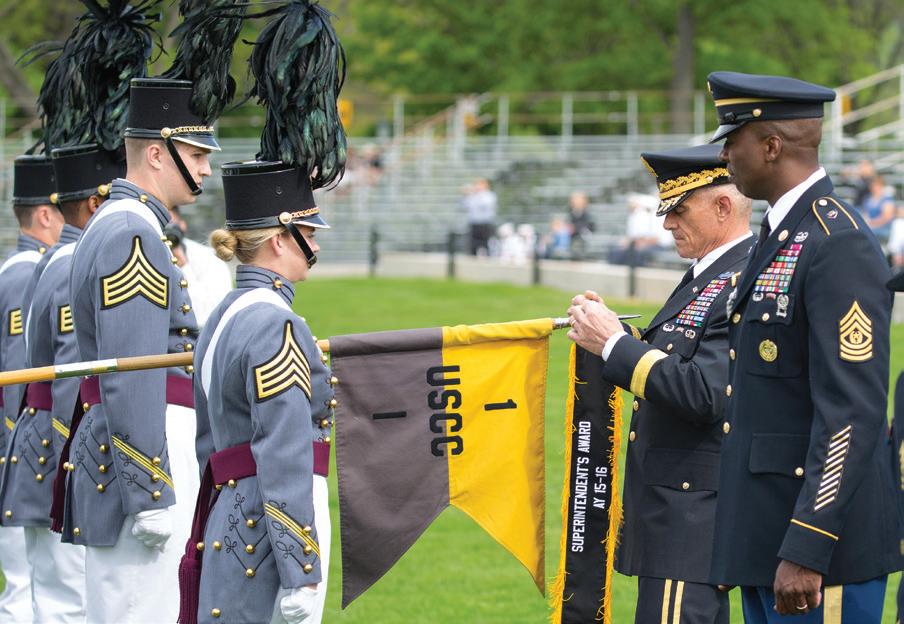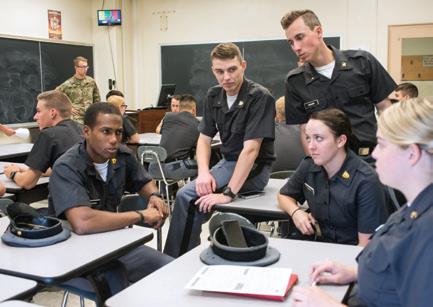
3 minute read
Every Graduate
a Leader of Character: Character Education at the World’s Premier Leader Development Institution
By Keith J. Hamel, WPAOG staff
Advertisement
W hen Brigadier General Douglas MacArthur, Class of 1903, became the 31st Superintendent of West Point in 1919, he drew on his firsthand experiences in World War I to introduce major changes at the Academy. Most notably, recognizing the intense physical demands of modern warfare, MacArthur instituted mandatory athletics for the Corps, or what has become known as the “every cadet an athlete” legacy. Nearly one hundred years later, when he became West Point’s 59th Superintendent in 2013, Lieutenant General Robert L. Caslen Jr. ’75 began enacting changes at the Academy based on his own wartime experiences as a division commander in Iraq. “I was writing an average of one-anda-half letters of reprimand per week for senior leader moral misconducts as part of Article 15 or non-judicial punishment,” says Caslen. “I asked my Staff Judge Advocate to explain how we could have 78 leader misconducts in a year, and I was shocked when he told me that we were no different than any other division.” Based on his experience of this downrange crisis of leadership, Caslen developed an initiative when he became Superintendent to fortify the character of each cadet, the Army’s future leaders. The policy for this initiative, Honorable Living and Building Trust, is already starting to bear fruit at the Academy today and, through its graduates, could possibly transform the Army in the future.
“When I was Commandant of Cadets from 2006 to 2008, I thought about the challenge of getting cadets to internalize values,” Caslen says, “but when I saw firsthand the consequences of senior leader misconduct downrange, I realized that I needed to take action.” Less than a year after assuming command of West Point, the Superintendent released a White Paper titled “Honorable Living and Building Trust” that establishes the foundation of West Point’s Character Development strategy for cadets, aimed at fulfilling the Academy’s mission statement to graduate “leaders of character.” Throughout its pages, this White Paper stresses what it means for a cadet to live and serve honorably, and why leading a life of honor is critical to building trust within the military profession. In short, living honorably means constantly maintaining West Point’s values, namely “Duty, Honor, Country,” and always adhering to the Army ethic. This is vital because, as a subsequent draft outlines, good character builds trust, and trust enables leaders to conduct decentralized operations without constant oversight, making their units militarily effective; conversely, weak character breeds mistrust, undermines unit cohesion, and degrades military effectiveness. Boiled down to its essence, living honorably could mean the difference between life and death in the Army profession.
Since its dissemination nearly three years ago, the Superintendent’s White Paper has generated widespread discussion among the West Point community. “Cadets started embracing moral development, and the entire West Point population started questioning themselves and their behavior,” Caslen says. He is particularly encouraged by the reaction among cadets serving on the Cadet Honor Committee: “Given that they are responsible for building diverse and inclusive teams, I am especially pleased to see these cadets discuss what it means to live honorably and debate the consequences of their behavior or actions as leaders.”
Yet, challenges still remain. One of the biggest that the Superintendent faces is the impact of technology on character, particularly social media. “Social media magnifies and contributes to the gap between the value set with which cadets come to West Point and the values of Duty, Honor, Country,” Caslen says. “It allows cadets to live a set of values online that are different from the values they must live in public.” According to the Superintendent, the private life-public life divide of social media is one with which cadets constantly must wrestle. “The American people and our soldiers expect us to behave honorably and inspirationally all the time,” Caslen says. “They do not make a distinction between private life and public life, even if we believe that distinction exists.” Given that social media allows users to post things anonymously, it is easy to say things one would not utter in a public sphere. The Superintendent’s solution to this situational ethic is for cadets to apply the following test: “If you can’t stand in front of a group of people and say something out loud, then don’t say it from behind a screen by posting it on social media.” But anonymity is not his only concern when it comes to social media. “Cadets, like other individuals their own age, tend to be sensitive to what’s said about them on social media,” he says. This is a potential problem when it comes to making a correction among their peers; rather than risk being criticized on social media, a cadet may look the other way and not reinforce the standard. The non-toleration clause is already the hardest part of the Honor Code for cadets to uphold, and social media compounds this with the fear of reprisal.

Despite the above challenges, Caslen believes the “Honorable Living and Building Trust” policy is making a difference. Data submitted to the Superintendent’s Office at the end of the 2015-16







